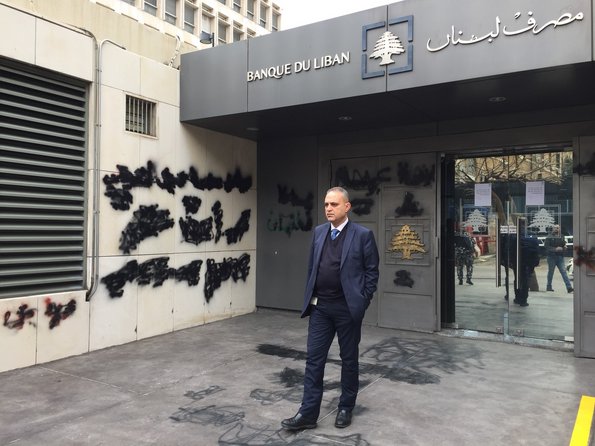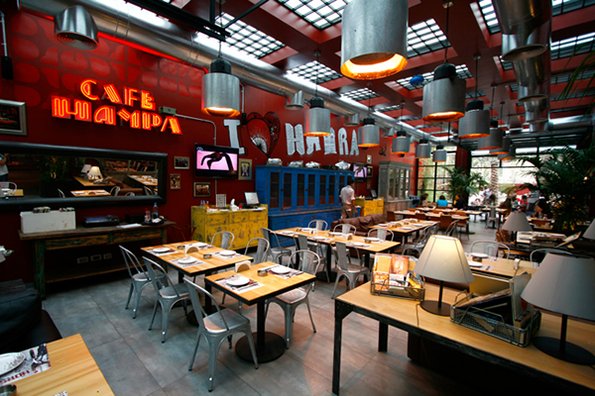Beirut is closing down
Economic crisis and divided politicians put pressure on population
by Karin Leukefeld, Beirut
It is the middle of January and raining cats and dogs. The streets of Beirut are quickly turning into small streams flowing every which way and making it difficult for pedestrians to move forward. Snow is spreading over the mountain peaks like a white blanket, providing a pleasant coolness to nature, that has been parched by the summer sun. The weather in the Cedar State changes quickly, and so the more than 2600-metre-high, snow-covered Sannine mountain, barely 50 km from the Lebanese capital, may shine in the evening sun later in the day. But people do not have time for such natural events. The economic crisis and an ongoing political dispute are putting them under pressure.
Government dispute blocks oil imports
There is hardly any electricity, so often large parts of the country are in the dark. The oil needed to generate electricity is being rocked on tankers off the Lebanese coast. Meanwhile, the government is arguing over who is authorised to release money from the central bank to pay oil suppliers. The necessary amount is daily augmented by penalties of around 25,000 US dollars that the cedar state has to pay for as long as the oil cannot be pumped from the tankers.
The background to the dispute is the pending election of a new president who would have the relevant authority. According to Lebanon’s confessional system, the presidency is due to a Maronite Christian. The members of parliament have so far not been able to agree on a candidate, and therefore Prime Minister Najib Mikati, who is – in compliance with the confessional system – a Sunni Muslim, is temporarily running the government. However, the (Christian Maronite) Free Patriotic Movement (FPM) are withholding their approval from him. Nor do they agree to a government meeting which Mikati wants to hold in order to persuade all ministers in office to agree to the disbursement of the money due to oil suppliers.
According to recent reports, Mikati has called for a meeting of the incumbent government next Wednesday to find a solution to the impasse. Last week, Mikati had reportedly conferred with parliament speaker Nabih Berri – in accord with the confessional constitution a Shiite Muslim – with his political adviser and an adviser to Hizbullah leader Hassan Nasrallah, and all had agreed that a cabinet meeting was needed. The Lebanese online newspaper “Nahar Net”, citing “his circles”, reported that Berri had said it was “unacceptable to paralyse a country and the affairs of its people just to benefit a particular political party.” This refers to the Free Patriotic Movement.
Laughing third parties in this dispute are the private oil importers. They mostly own large and numerous generators with which they produce electricity and offer it where the government does nothing. These oil barons buy oil with their own foreign currency and then sell their electricity expensively to consumers.
Protests remain absent
The population does not protest against the political elites’ haggling. Everyday life demands all the people’s strength – they have to feed themselves and their families, especially their children. Some men ride on small, battery-powered two-wheelers from one job to the other, others deliver goods of all kinds ordered by the few wealthy Lebanese, by hotels or businesses, in TukTuks, three-wheelers made in India that have the luxury of a roof.
The topic of the day in Beirut is the exchange rate between the US dollar and the euro. Families receive these currencies from their relatives abroad, provided they have relatives there who earn money. “God loves those who have relatives abroad”, they say. Whereas a few months ago you received more Lebanese pounds for one US dollar than for one euro, the situation has now reversed itself. “You now get 48 for a US dollar and between 50 and 52 for a euro from a good, trustworthy middleman,” explains Basma, the young receptionist at a middle-class hotel. “Others might give you 47 and 48.” What is meant is 48,000 or 50,000 to 52,000 Lebanese pounds. Middlemen are officially authorised to exchange foreign currency in small booths and shops, and they take a sometimes-hefty commission from those who want to exchange euros or US dollars.
Basma has only been in her job for a few weeks, but manages all its demands very confidently. Her predecessor Heba left Lebanon at the end of 2022 to start a new life in Canada with her future husband. Young people are leaving the country in droves to find work and a life of dignity in one of the Gulf States, in Africa or on another continent, far from home. The ongoing economic crisis that started with the banking crash in 2019 is destroying the middle class and all prospects of a good life and work for the younger generations.
Survival strategies
Those who have worked all their lives to build modest prosperity for themselves and their families in Lebanon are left empty-handed. A 68-year-old businessman, who does not want to make his real name public, spent his youth in the Lebanese civil war. Later, he built up a business that at least brought in enough for him to buy a good flat and put some money aside.
Now the man is no longer able to pay the utilities of his freehold condominium. He has to pay 800 US dollars a month for electricity, water, the lift and other utilities, which he can no longer afford. He does not get a pension and what he had set aside in his bank account has vanished into thin air with the 2019 banking crisis. The only way to survive is to rent out his own flat to someone who is better off and still has a good income. He himself has moved to a small flat in the house of friends. With the rent from his freehold flat, he can continue to pay the utilities as well as afford the new, lower rent. Getting ill is out of the question.
Shops and restaurants are closing
Closed and empty shops characterise the image of Beirut in many neighbourhoods. Even in Hamra, for decades the cultural and political centre of the Lebanese capital, the lights are going out. Shops and restaurants are closing because they can no longer afford the costs and customers are staying away.
Before Christmas, the legendary Hamra Café was also hit. The numerous photos on its walls depicted well-known politicians, journalists and intellectuals in discussion with each other and debating at events there over the decades. Collections of books and magazines invited people to linger. Posters, photos of demonstrations in the 1960s gave an idea of what Beirut had once been like. Now the shutters are down, the doors remain closed.
Under the narrow canopy of the legendary meeting place of yesteryear, a woman is sitting cross-legged and staring motionless in front of her. Her baby is sleeping on her lap, the woman’s face is framed by a tight-fitting black headscarf. She seems too tired to hold out her empty hand to the few passers-by hurrying past her through the rain. And the café’s guests, who had at least slipped her something from time to time, will never return. No one will ever again hear the religious formulas with which she encouraged people, and herself too, to give to her and her baby and be rewarded with praise from God in return. •
First published in “Zeitung vum Lëtzebuerger Vollek”, 18 January 2023,
supplemented by box; reprinted with kind permission of the author
(Translation Current Concerns)

(picture Karin Leukefeld)
Power and Energy
ap/kl. Last Wednesday, 18 January, the interim government of incumbent Prime Minister Najib Mikati released a credit line totalling 116 million US dollars to stabilise electricity supply in the country. 62 million US dollars are to pay costs and fees of oil tankers waiting off the coast to discharge their cargo. 54 million US dollars are earmarked for repairs and maintenance of the two ailing electricity plants Zahran and Deir Ammar.
The state-owned electricity company (Éléctricité du Liban, EDL), founded in the 1990s, has gobbled up more than 40 billion US dollars over decades without stabilising the power supply and carrying out necessary maintenance. The company is losing about 1.5 billion US dollars a year. The World Bank and the International Monetary Fund (IMF) make the reorganisation of Lebanon’s energy sector a precondition for the granting of loans. Currently, Lebanon is dependent on a contract with Iraq, which was signed in the summer of 2021. Iraq supplies heavy oil. Lebanon sells this oil to companies that process it so that it can be used in Lebanese power plants. In return, Lebanon supplies products and services, especially in the medical field.
(Translation Current Concerns)
